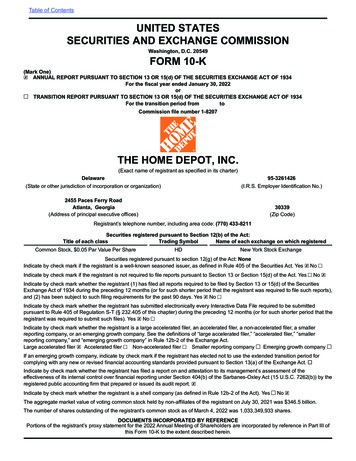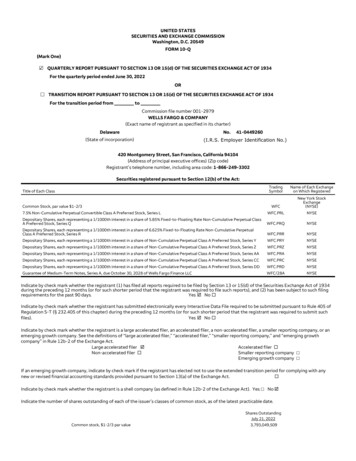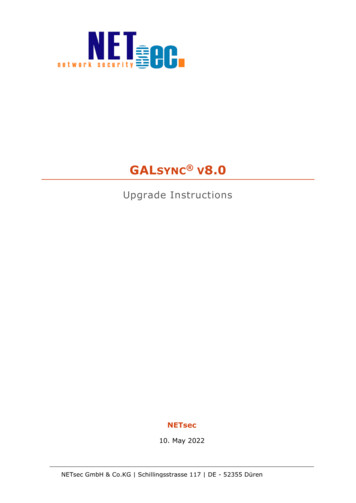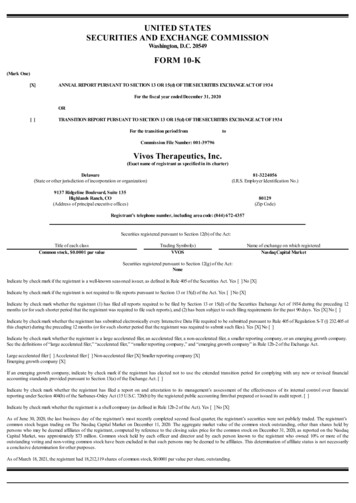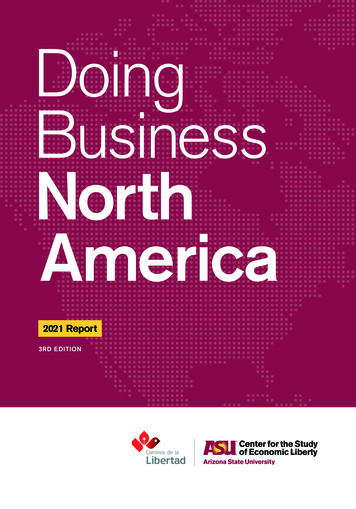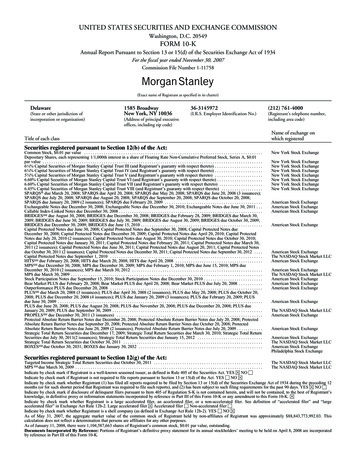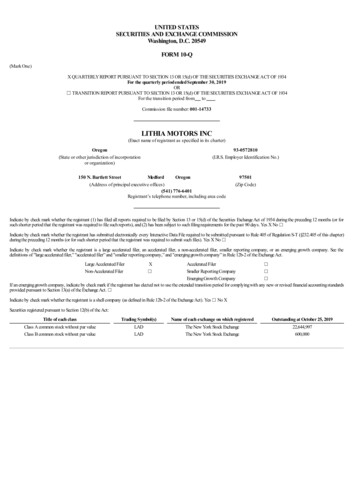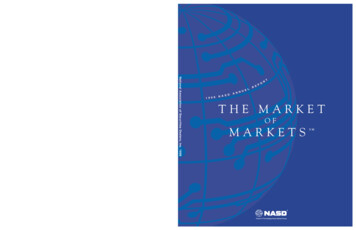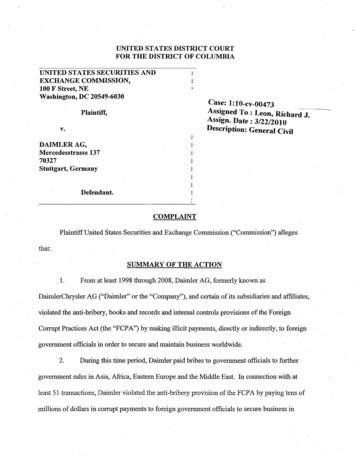
Transcription
UNITED STATES DISTRICT COURTFOR THE DISTRICT OF COLUMBIAUNITED STATES SECURITIES ANDEXCHANGE COMMISSION,100 F Street,NEWashington, DC 20549-6030Case: 1:10-cv-00473Ass gned To : Leon, RichardJ-.- ASSIgn. Date: 3/22/2010Description: General CivilPlaintiff,v.DAIMLERAG,.Mercedesstrasse 13770327. Stuttgart, GermanyDefendant.COMPLAINTPlaintiff United States Securities and Exchange Commission ("Commission") allegesthat:SUMMARY OF THE ACTION1.From at least 1998 through 2008, Daimler AG, formerly knoWn asDaimlerChrysler AG ("Daimler" or the "Company"), and certain of its subsidiaries and affiliates,violated the anti-bribery, books and records and internal controls provisions ofthe ForeignCorrupt Practices Act (the "FCPA") by making illicit payments, directly or indirectly, to foreigngovernment officials in order to secure and maintain business worldWide.2.During this time period, Daimler paid bribes to government officials to furthergovernment sales in Asia, Africa, Eastern Europe and the Middle East. In connection With atleast 51 transactions, Daimler violated the anti-bribery provision of the FCPA by paying tens ofmillions of dollars in corrupt payments to foreign government officials to secure business in
· Russia,Chilia,Vietnam, Nigeria, Hungary, Latvia, Croatia and Bosnia. These corrupt paymentswere made through the use of U.S. mails or the means or instrumentality of U.S. interstatecommerce.3.Daimler also violated the FCPA's books and records and internal controlsprovisions in connection with the 51 transactions and at least an additional 154 transactions, inwhich it made improper payments totaling atleast 56 million to secure business in 22 countries,including, among others, Russia, China, Nigeria, Vietnam, Egypt, Greece, Hungary, NorthKorea, andIndonesia. Through these tainted sales transactions, which involved at least 6,300commercial vehicles and 500 passenger cars, Daimler earned 1.9 billion in revenue and at least 91.4 million in illegal profits.4.Nineteen ofthese transactions, which occurred between approximately 2001through 2003, involved direct and indirect sales of motor vehicles· and spare parts under theUnited Nations Oil for Food Program. ThoSe transactions included 6,048,948 in bribes in theform of under-the-table "after sales service fees." Daimler offered to pay kickbacks of more.than 1 million under six direct contracts with Iraqi ministries; made one payment of 7,134under a direct contract; and knowingly acquiesced in the payment of another 5 million inkickbacks by its contract partners in connection with twelve indirect Oil for Food contracts.5. .A number of Daimler's former senior executives, who operated in a decentralized.corporate structure, permitted or were directly involved in the Company's bribery practices,including the head of its overseas sales department, who reported directly to the Company's mostsenior officers. The Company's internal audit, legal, and finance and accounting departments,which should have provided checks on the activities of the sales force, instead played importantroles in the subversion of internal controls and obfuscation of corporate records.2
6.The improper paYments were made possible inpart as a result of the falsificationof corporate records and a lax system of internal controls.7.In this environment, Daimler developed several organized procedures andmechanisms through which improper payments could be made. Daimler's books and recordscontained over 200 ledger accounts, knoWn internally as "interne Fremdkonten," or, "internalthird party accounts," which reflected credit balances controlled by Daimler subsidiaries oroutside third parties. Certain Daimler employees used numerous such accounts to make orfacilitate improper payments to foreign government officials. Bribes were also made through theuse of "corporate cash desks" fwhere sales executives would obtain cash in amounts as high as400,000 Deutsche Marks for making improper payments), deceptive pricing and commissionarrangements, phony sales intermediaries, rogue business partners and misuse of inter-companyand debtor accounts.JURISDICTION AND VENUE8.This court has jurisdiction over this action under Sections 21 (d), 21 (e), and 27 ofthe Exchange Act [15 U.S.C. §§78u(d), 78u(e) and 78aa]. Daimler, directly or indirectly, madeuse of the means or instrumentalities of interstate commerce, of the mails, or of the facilities of anational securities exchange in connection with the transactions, acts, practices, and courses ofbusiness alleged in this Complaint.9.Venue is appropriate in this Court under Section 27 of the Exchange Act[1S·U.S.C. § 78aa] because Daimler, as a U.S. issuer, files required periodic reports with theCommission in this judicial district.3
DEFENDANT10.Daimler, a publicly-held corporation organized under the laws ofthe FederalRepublic of Germany, is a global company primarily engaged in manufactUring automobiles.The Company is headquartered in Stuttgart, Germany;l The Company's' comnion stock isregistered with the Commission pursuant to Section 12(b) [15 U.S.C. § 781(b)] of the ExchangeAct and is listed on the New York Stock Exchange, where its stock is traded under the symbolDAI.FACTS11.From at least 1998, employees of Daimler and certain of its subsidiaries andaffiliates made improper payments to foreign government officials· to further sales in manycountries. This conduct dates back to a time when such payments were not prohibited byGerman law, and therefore were tax deductible according to the German Tax Code.12.Daimler internally referred to these payments as "N.A." payments; which was theabbreviation of the German term niitzliche Aufwendungen, meaning "useful expenditures" or"usefulpaynients."13.In February 1999, Germany outlawed foreign bribery when the Organization forEconomicCooperation and Development("OECD")Anti-Bribery Convention,which Germany.'.':.' .ratified, entered nito force. Daimler, however, had been prohibited from making bribes toforeign government officials under the FCPA since 1993 when its predecessor, Daimler-BenzAG, registered a class of securities under .§ 12 of the Exchange Act.14.Notwithstanding its statUs as a U.S. issuer, the Company failed to end its long-standing bribery practices and bring its overseas sales business into compliance with the FCPA.1 Up until the divestiture of Daimler's Chrysler division in May 2007, the Compariy was known asDaimlerChrysler AG, which was the product of the 1998 merger between Daimler-Benz and Chrysler Corporation.4
15.In fact, until recently, Daimler's FCPA compliance program, outside its formerU.S.-based Chrysler division, was virtually non-existent, even though the Company hasthousands of employees and dozens of affiliates and business units selling vehicles to foreigngovernments and government-related entities in many foreign countries.16.Although Daimler adopted a corporate Integrity Code in July 1999, whichinCluded anti-bribery provisions, it failed to adequately enforce those provisions or trainemployees outside the U.S. on FCPA compliance.17.Daimler also failed to implement meaningful oversight of the activities of its salesforce. Accounting· and legal personnel often reported to top sales management, rather thanindependent, centralized departments with compliance functions. In several instances, in fact,Daimler's legal and accounting departments aided .the corrupt practices of the sales departmentsrather than provide a safeguard against such practices.18.Daimler also failed to maintain adequate controls over the selection of, orpayments to, sales intermediaries, many of whom were actually nominees for govemrnentofficials, or over the establishment and use of bank accounts.19.Daimler and certain of its subsidiaries and affiliates utilized a variety ofinstruments to make improper payments in.at least 22 countries around the world.20.The instruplents through which improper paYments were made included hundredsofledger accounts on Daimler's own books, corporate "cash desks" (where sales personnelwould obtain cash), deceptive pricing and commission arrangements, offshore bank accounts,inflated service fees, and nominees for government officials improperly described as "salesintermediaries" and "consultants."5
21.Daimler's practice of securing business through the payment of bribes to foreigngovernment officials permeated to several major business units and subsidiaries and wassanctioned by its senior management. Daimler's corrupt practices were carried out by majordepartment heads of Daimler Overseas Sales and Commercial Vehicles.22.Similarly, improper payments were authorized by or known to the former headsof Daimler's Overseas Sales and Commercial Vehicles departments, the former heads of DaimlerExport and Trade Finance (a subsidiary of Daimler Financial Services), and the former heads ofDaimler's subsidiaries in Vietnam, China, Turkey, Indonesia, Ivory Coast, Nigeria, Russia andthe EvoBus subsidiary ("EvoBus").A.Daimler Used "Third-Party" Ledger Accounts to Facilitate Bribes23.When Daimler-Benz AG merged with Chrysler Corp. in November 1998, Daimlermaintained over 200 ledger accounts known as "internal third party accounts" ("TPA" or"TPAs"), referred to in German as interne Fremdkonten, which were used for numerous businesspurposes. Since at least 1977, Daimler maintained written policies governing the operation ofTPAs. Daimler's Overseas Sales department ("Overseas Sales") in many instances misusedcertain ofthese TPAs to facilitate improper payments to foreign government officials in Africa,Eastern Europe and the Middle East.24.Certain TPAs were managed by the most senior Overseas Salesexecutives,including the former head of Overseas Sales. The former head of [mance and controlling forOverseas Sales and the then heads of certain Daimler subsidiaries also authorized disbursementsfrom TPAs.25.Although the TPAs were·internal Daimler general ledger accounts· and managedby employees of Daimler and certain of its subsidiaries and affiliates, the funds in certain of the6
TPAs were disbursed according to instructions given by third-party beneficiaries of the accounts,including government officials. Such credits recordedin the TPAs-usually were disbursed incash or by wiring the money to bank accounts throughout the world.26.Some of the TPAs were known only to the few Daimler employees managingthem, and payments from the accounts were often confidential, meaning that funds credited toand debited from these accounts and cash disbursements were often not transparent or subject toa paper trail or other financial controls.27.Given the unreguhited nature ofthese accounts, over time, TPAs were used toforward large sums of cash throughout the world, assist Daimler's outside business partners andsubsidiaries evade taxes in their respective countries of operation and pay salaries for Daimlerexpatriate employees working overseas, which, in effect, improperly shielded these funds fromGerman tax authorities.28.Daimler maintained several TPAs on its general ledger in the name ofits ownoverseas subsidiaries, which were controlled by the then heads of the subsidiaries and former.Overseas Sales senior executives and used to facilitate government deals.29.In other cases, TPAs were maintained in Daimler's general ledger in the names ofthird parties outside the Company, including foreign government officials or Daimler's dealers,.distributors or other agents, who were at times used as intermediaries to make payments toforeign government officials.30.Daimler, for example, maintained a TPA called "Consulting Egypt" for thebenefit of a senior official of a government-owned factory that purchased Daimler chassis andparts and assembled and sold personnel carriers to the EgyPtian Army. From 1998 to 2004,7
Daimler paid the official through credits to the TPA 1,123,224 Deutsche Mark ("DM") and later 322,101 to secure th sale of vehicle chassis and fue trucks to the factory.31.TPAs were also funded by money obtained from the government customersthemselves through one of several bogus pricing mechanisms, such as "price surcharges," "priceindusions," or excessive commissions, "discounts" or "rebates."32.These artificial pricing mechanisms were used by Daimler or its agent to build areserve into the price the government customerpaid for the vehicle, which was credited (i.e.,kicked back) into a TPA and later paid out as a bribe to or for the benefit of foreign governmentofficials. In the case of artificial.discounts or rebates on sales contracts, all or a portion of thediscount would be kicked.back, through the TPA, to a foreign government official, rather thanthe purchasing government customer.33.Under this scenario, Daimler held the money generated from a fraudulent pricingarrangement in a TPA until the TPA beneficiary or Daimler subsidiary or agent directed atransfer of the funds. Daimler, however, did not accumulate any interest or other charges formaintaining these funds for its account holders and the funds could be carried on the Company'sbooks indefinitely.34.Prior to 2002; Daimler's TPA policies also permitted senior executives, including.the former head ofOverseas Sales, the former head offinance and controlling for Overseas Salesand former heads of subsidiaries, to authorize cash disbursements from TPAs.35.The cash was disbursed from a "cash desk" located at a Daimler facility inStuttgart, Germany, and a corresponding debit was booked to the relevant TPA.36.Daimler failed toadequatdy monitor where cash was being directed or whethercash disbursements were being made for legitimate business purposes.8
37.In connection with its government customers in Nigeria, for example, Daimleremployees withdrew DM 400,000 and 150,000 from the cash desk and transported the Marks. and US dollars to Nigeria to pay bribes to foreign government officials.38.In 2002, Daimler closed its cash desk in Stuttgart, but cash payments continued to.be made through its subsidiaries or through offshore bank accounts. Daimler instituted newpolicies in 2002 requiring the beneficiaries of TPAs to designate a "reference bank account" towhich payments could be wired or otherwise transferred (eliminating the need for cashdisbursements). However, the policies did not requiTe that the bank account be maintained in a.country in which the account holder resided or where the services of the bank accountbeneficiary were purportedly rendered.1.39.Daimler Paid Bribes Through TPAs in NigeriaDaimler made bribe payments and kept funds that were not properly recorded onits books through four TPAs that were held by Anambra Motor ManufactUring Company.("Anammco"), a then Daimler-controlled jointventure between Daimler and the Federal MilitaryGovernment of the Federal Republic of Nigeria, through which Daimler sold vehicles intoNigeria. Daimler sold its interest in the joint venture in 2007.40.'A portion of Daimler's proceeds from the sale of vehiclesin Nigeria was credited.-.to the Artammco TPAs. Senior executives of Daimler then uSed a portion ofthese credits to fundimproper payments to foreign government officials.41.Between 1998 and 2005, Daimler paid approximately DM 3.9 million, 1 millionand 230,OOO in improper payments to Nigerian government officials. The bribe payments fromthe Anammco TPAs were made to secure sales contracts worth approximately 73 million withat least seven different government customers. These payments were either improperly recorded9
in Daimler's books and records or were not recorded at all and were made as a result of weakinternal controls.42.The Anammco TPAs were controlled by the former head of Overseas Sales and.the former head of Daimler's Nigerian office through which Daimler carried out its business inNigeria (the."Nigerian representative office"), who also was the managing director of Anammco.These two former executives had decision-making authority overthe sales operations in Nigeria,and they were able to direct large scale bribe payments.43.For example, in order to obtain a deal to sell armored vehicles to the Nigeriangovernment, the former head of Overseas Sales authorized the former head of Daimler'sNigerian representative office to debit an Anammco TPA and pay DM 200,000 and OM 50,000,respectively, to two semor Nigerian government officials, who had decision-making authorityover the contract. Daimler employees then wired the funds to the personal foreign bank accountsof these two officials in England and Germany.44.Similarly, in order to obtain another deal involving the sale of cotnmercialvehicles to a Nigerian state-owned entity, the former head ofthe Nigerian representative officeeffectuated a debit of nearly 200,000 froni an Anammco TPA and had the funds wired from aDaimler bank account in Germany to a bank account in England held by the entity's maIlagingdirector.45.The former head of Overseas Sales and the former head ofthe Nigerianrepresentative office also routinely withdrew large smus of cash in various currencies fromDaimler's corporate cash desk in Germany to make bribe payments to secure business in Nigeria.46.Daimler failed to adequately monitor the amount of cash that could be withdrawnthrough the cash desk or understand the purpose of the withdrawals. The former head of the10
Nigerian representative office, for example, was authorized by the former head of Overseas Salesto debit an Anammco TPA to obtain DM 400,000 in cash from the cash desk for use towards thehotel stay, travel, dining and shopping of a senior Nigerian government official, his delegationand their relatives.47.In connection with the contract to sell buses to a Nigerian state-owned entity, theformer head of the Nigeria representative office withdrew 110,000 in cash from the cash deskand delivered the funds from Germany to Nigeria to make bribe payments to governmentofficials affiliated with the entity.48.At one point, the former head of the Nigerian representative office and a seniorsales manager for Anammco opened up at leasttwo Swiss bank accounts, which were funded bycredit balances in Anammco TPAs.49.The former head of Overseas Sales authorized approximately DM 2.1 million tobe transferred from Anammco TPAs into these Swiss bank accounts for payment to governmentofficials to obtain sales contracts with various agencies of the Nigerian government.2.50.Star Auto, S.A.Daimler made a series of bribe payments through a TPA that was maintained forthe benefit of Star Auto S.A. ("Star Auto"), at the time a Daimler majority owned and controlledentity based in the Ivory Coast.51.Star Auto operated as Daimler's general dealer in the Ivory Coast, and salesintermediary when direct sales were made between Overseas Sales and West African customers.Star Auto operated a regional center for coordinating sales. in 14 West African countries.Daimler sold its interest in Star Auto in 2008.11
52.The fonner head of Overseas Sales, the fonner head of finance and controlling forOverseas Sales, and the fonner managing director ofStar Auto controlled the Star Auto TPA.53.The three fonner Daimler executives also controlled an off-the-books Gennanbank account at Volksbank, which was used in conjunction with the Star Auto TPA to makeimproper payments and existed outside Daimler's accounting system.54.Through the Star Auto TPA and the bank account at Volksbank, the three fannerexecutives made improper payments to government officials in Ghana, Liberia and Poland in theamounts ofDM 630,000, 170,000 and 111,175,securing at least 24.5 million in vehicle salesbetween 1998 and 2004.55.The three fonner executives disguised the true purpose of the payments from theStar Auto TPA, which resulted in inaccuracies in Daimler's books and records.56.For example, in an effort to enter the trucking market in Poland through the saleof 30 trucks to a Polish government entity and establishment of a local office in Warsaw, in 2004fonner Daimler executives made cash bribe payments totaling 1 00,000 to a high ranking Polishgovernment official who representedthe government entity in the deal. The cash was withdrawn .from the Star Auto account at Volksbank against credit balances in the Star Auto TPA andpersonally delivered by thefonner head of Overseas Sales and another senior Overseas Salesexecutive to the government official at a·hotel roOm in Stuttgart, Gennany.Thefonnermanaging director of Star Auto then improperly noted in an internal memo that 60,000ofthe 100,000 was paid in connection with "service expenses for major Polish customers (Mail roadconstruction project)." Similarly, the remaining 40,000 cash payment was improperlyreferenced in an internal document as a payment for "consulting services with regard to theWarsaw branch office for trucks."12
57.In other deals where Daimler used the Star Auto TPA to make the bribepayments, the Company used phony intermediaries or its own outside dealers to disguise the truenature and purpose ofthe payments.58.Daimler, for example, obtained a sales contract to supply 100 trucks to thegovernment of Liberia by providing a free armored Mercedes G 500 vehicl worth nearly 600,000 to a senior Liberian government official. Daimler then arranged to pay its outsidedealer in Liberia 600,000, which wasmischaracterized as commissions, and which the dealerthen used to pay for the vehicle. This deceptive structuring ofthe deal made it appear as if the. dealer purchased the vehicle when, in fact, Daimler employees gifted the vehicle to the Liberiangovernment official as a bribe3.·59.Daimler Refuses to Stop Using TPAs to Make Bribes Despite RisksFor many years, Daimler used TPAs to make bribes despite being aware ofthelegal risks associated with the a,ccounts. 60.An internal audit report, dated March 24, 1986, acknowledged that the accountsmight violate the laws of other countries and that disclosure of the TPAs to certain governmentscould pose "significant difficulties" for the Company as well as the beneficiaries of the accounts.61.Consequently, pursuant to corporate policy, TPAs were maintained with "absolute·confidenti3.Iity" and only "in the knowledge of a few [Daimler] employees."62.After foreign bribery became illegal in Germany in 1999, Daimler's internal auditdepartment placed senior executives at the Company on notice that internal control weaknessesassociated with the TPAs left the accounts susceptible to being used for bribery.63.The former head of internal audit for Daimler's operations outside ofNorthAmerica became concerned that the approximately 200 TPAs in existence at that time would13
continue to be used for effectuating bribes, as had been Daimler's practice prior to the change inGerman law. Concerned about this risk and possible misuse of the TPAs, in early 2000, theinternal audit head directed his internal audit staff to conduct a review of all the Company'sTPAs.64. In a May 2000 memo to senior sales and finance personnel, Daimler's internalaudit staff warned that there was a high risk that the TPAs did not comport with either theCompany's Integrity Code or changed German law. Another internal audit memo stated that, bynot revising. guidelines over the use of TPAs, the Company could be viewed as facilitating"fraudulent transactions withIn the organization."65.The May 2000 memo further. noted that, given the lack of internal controls overTPAs, internal audit could be held responsible for failing to take remedial measures shouldcertain transactions occur and become public.66.Accordingly, the May 2000 memo recoinmended that internal audit, among other.things, review all TPAs to determine whether commission payments were legitimate, conduct .audits of all operational sales departments to "identify favors granted that might be problematicfrom a legal point of view and cancelling them as soon as possible," and obligate all Daimlercontract partners to provide written confirmation that no commission or resale price marginswould be passed throughto "sub agents.".67.In the same memo, internal audit also recommended to senior executives ofOverseas Sales and the finance and accounting department that the Company: (1) close the TPAs"unless there is documented proof that the funds in TPAs are necessary. for legitimate businesspurposes; (2) obtain documented proof of actual services rendered by an outside agent and14
business partners before paying commissions; and (3) obtain representations that commissionsare not passed through to "sub agents."68. .In August 2000, the internal audit staff created a formal audit report entitled"Review of Internal Control Procedures Invoicing Process GFNIL" that addressed internalcontrols risks surroUhding TPAs.69.The summary ofthe audit report, which was sent to certain membersof the Boardof Management, reflected that ''the correctness of invoice processing and settlement of .commissions/discounts are subject to serious risks," including the "[a]bsence of centralobligatory internal controls principles for the respective business units" ofthe Company. Thesummary further stated that such internal controls issues increase the risk of fraud and"endangers the adherence to the [Company's] Integrity code."70.The body of the August 2000 report, which was sent to senior [mance and salesexecutives, went on to further state that internal controls surrounding the invoicing, commissionpayments and rebate accounting in the sales.organization were weak, lacked central oversightand subjected Daimler to fraud risks.71.The body of the report further noted that there were "fundamental gaps insecurity" in the way the sales organization paid commissions and invoiced customers "which.will necessarily lead to serious .risks of fraudulent actsto the detrimeIitof[Daiinler] and tocorresponding risks with respect to compliance with the Integrity Code."72.Despite such warnings from internal audit, those who received the summary andbody ofthe internal audit report failed to direct the Company's accounting departmenttoimprove internal controls surrounding the TPAs, let alone close the accounts.15
73.The Board of Management failed to direct internal audit to audit the TPAs andassociated bank accounts to determine whether the TPAs were operating in compliance withanti"'bribery laws.74.Daimler's internal audit staff also faced pressure to keep TPAs open from former. senior Overseas Sales executives, such as the former head of Overseas Sales and the former headof finance and controlling for Overseas Sales, who feared a potential loss .of sales volume if theTPAs were eliminated. As reflected in internal audit memos, former Overseas Salesmanagement also resisted improvements in internal controls and transparency for the TPAs.75.In 2002, although the Company decided to reduce the number ofTPAsto 50 and. shut down its central cash desk, cash payments continued to be made through cash desks andbank accounts controlled by its subsidiaries, and the Company failed to effectively improvecontrols surrounding the remaining TPAs.76.The 50 TPAs remained open over the objections of the internal audit head, and hisdepartment's efforts to rein in the use ofTPAswas hampered by Daimler's decentralizedcorporate structure and, according to the internal audit head, the Company's expectation thatinternal audit not serve a "police function."77. Internal audit ultimately recommended that senior sales management-theindividuals most responsible for directing bribes to secure sales-conducta "self.audit" to .determine whether bribes were paid from the TPAs. The remaining open TPAs were closed in2004 and 2005, only after the Commission began its investigation.B.Daimler Used Other Ledger Accounts to Facilitate Bribes78.In addition to TPAs, Daimler used a variety of other ledger accounts to makecorrupt payments to foreign government officials to secure vehicle sales and other business.16
79.Similar to TPAs, the money in the other ledger accounts used for bribes was oftengenerated from fraudulent pricing arrangements.80.In connection with certain sales of passenger cars in Russia and commercialvehicles in China, for example, Daimler and certain of its subsidiaries and affiliates routinelyover-invoiced the government customers between 10%-30% for phony add-ons such as parts orservices that were not delivered (and never intended to be delivered), resulting in anoverpayment ofthe inflated contract price. The excess amount was then passed on to high ranking government officials through credits to inter-company and debtor accounts associatedwith the respective transactions, which were then transferred to bank accounts designated byforeign government officials.81.The improper payments to government officials or their designees through these· .ledger accounts were either not recorded on Daimler's books and records or inaccuratelyrecorded to disguise the true nature oithe payments.82.Daimler, for example, sold passenger cars to two Russian governmental entities.Daimler maintained on its books credit balances that were also used by certain Daimleremployees to make improper payments to bank accounts designated by government officialsassociated with the two Russian governmental entities. Credits to these accounts weremislabeled as "commissions," or "special discounts," oridentifiedas "N.A."83.In connection with government sales in Vietnam, former senior sales executives atDaimler's MB Vietnam subsidiary improperly booked corrupt payments in several expenseaccounts designated as "Key Accounts," Costs of Good Sold, "Gifts Line," "Petty Cash;" and"Broker Commissions."17
84.Likewise, Daimler's Indonesian subsidiary misused "empioyee vendor accounts,"which were intended for booking employee travel-related expenses, for booking large cashdisburserp.ents to officials from a state-owned company. Many ofthese payments were alsocharacterized as "fulfillment of commitment" on internal payment authorization sheets and wereim
overseas subsidiaries, which were controlled by the then heads ofthe subsidiaries and former .Overseas Sales senior executives and used to facilitate government deals. 29. In other cases, TPAs were maintained in Daimler's general ledger in the names of third parties outside the Company, including foreign government officials or Daimler's dealers,
